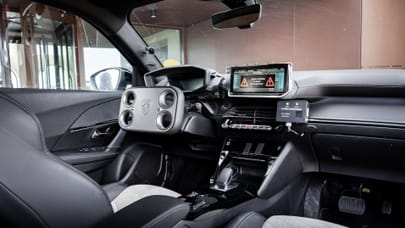
Tech crunch: here's what goes into making the Aston Martin Valkyrie
Check out all of the voodoo behind the Valkyrie’s astonishing performance

SELF STARTER

Aston only claims 0–60mph in under 3.0secs. Despite launch control it won’t be that fast off the line because it pulls away electrically, engaging the V12 at around 10mph, helping save the clutch. However, once up and running...
Advertisement - Page continues belowSMALL, MIGHTY

At 4,506mm long and 1,920mm wide the Valkyrie is quite compact. It’s only 1,060mm high – over 120mm lower than Ferrari’s 296 GTB. Ground clearance is 68mm, which the nose lift increases to 98mm. Watch out at speed bumps – the approach angle is a mere 7.5°
SHIFTY

There's a seven-speed sequential gearbox with hydraulic actuation, same as the suspension, steering and aero, mounted behind the engine. There’s no separate gear for reverse, that’s done electrically via the 141bhp e-motor and 1.68kWh battery.
Advertisement - Page continues belowBADGE ENGINEERING

Adrian Newey didn’t want a bonnet badge, but agreed to compromise when Aston showed him this etched titanium just 40 microns thick. Slender enough not to interfere with the paint lacquer and 99.4 per cent lighter than Aston’s regular badge.
STRUT YOUR STUFF

The suspension uses conventional double wishbones, but aero profiled and springs are torsion bars because they’re easier to package. The design of the 210-bar hydraulic suspension has some things in common with the Newey-designed Williams FW15 active suspension car of 1993.
BRAKING NOT BAD

Carbon ceramic brake discs measuring 420mm (front) and 385mm (rear) provide colossal stopping power and hide behind 20in front and 21in magnesium wheels. The 265/325mm wide tyres are by Michelin – the Valkyrie performs best on Cup 2Rs.
AERO BAR

The Valkyrie generates 1,100kg of downforce at 137mph. Aston doesn’t need it to develop more than that as it would have to compromise the suspension to cope, so above that speed active elements such as this one on the rear wing move to maintain that 1,100kg figure all the way to its maximum speed up beyond 220mph.
Advertisement - Page continues belowFIREPOWER

Air enters via the roof scoop, but so tight is the packaging that there’s no room for a traditional air filter. Instead that’s replaced by a pale grey membrane. The all-alloy 48v V12 itself weighs only 206kg and develops 1,001bhp at 10,600rpm, but keeps going to 11,100rpm. So hot are the exhaust gases that the metal deflector panel under the pipes is vital to prevent the numberplate from melting







